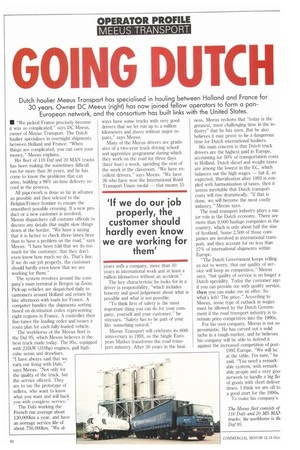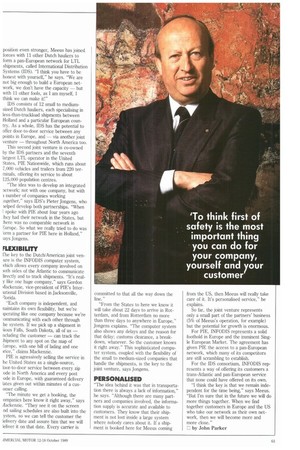GOING DUTCH
Page 64

Page 65

If you've noticed an error in this article please click here to report it so we can fix it.
• "We picked France precisely because it was so complicated," says DC Meeus, owner of Meeus Transport. The Dutch haulier specialises in overnight shipments between Holland and France: "When things are complicated, you can earn your money," Meeus explains.
His fleet of 110 Daf and 20 MAN trucks has been making the sometimes difficult run for more than 30 years, and he has come to know the problems that can arise, building a 98% on-time delivery record in the process.
All paperwork is done as far in advance as possible and then telexed to the Belgian/France frontier to ensure the smoothest possible crossing. If a new product or a new customer is involved, Meeus dispatchers call customs officials to discuss any details that might slow things down at the border. "We have a saying that it is better to check three times here than to have a problem on the road," says Meeus. "I have been told that we do too much for the customer; that they don't even know how much we do. That's fine. If we do our job properly, the customer should hardly even know that we are working for them."
The system revolves around the company's main terminal in Bergen op Zoom. Pick-up vehicles are dispatched daily to customers around Holland and return by late afternoon with loads for France. A computer handles the shipments sorting based on destination codes representing eight regions in France. A controller then fine-tunes the loading order and issues a route plan for each fully-loaded vehicle.
The workhorse of the Meeus fleet is the Daf 95, which Meeus believes is the best truck made today. The 95s, equipped with 231kW (310hp) engines, pull highcube semis and drawbars. "I have always said that we earn our living with Dafs," says Meeus. "Not only for the quality of the truck, but the service offered. They are to me the prototype of sellers, who want to know what you want and will back you with complete service."
The Dafs working the French run average about 130,000km a year, and have an average service life of about 750,000km. "We al ways have some trucks with very good drivers that we let run up to a million kilometers and above without major repairs," says Meeus.
Many of the Meeus drivers are graduates of a two-year truck driving school and apprentice programme during which they work on the road for three days (later four) a week, spending the rest of the week in the classroom. "We have excellent drivers," says Meeus. "We have 26 who have won the International Road Transport Union medal — that means 15 years with a company, more than 10 years in international work and at least a million kilometres without an accident."
The key characteristic he looks for in a driver is responsibility, "which includes honesty and good judgement about what is possible and what is not possible.
"To think first of safety is the most important thing you can do for your company, yourself and your customer," he stresses. "Safety has to be part of your life: something natural."
Meeus Transport will celebrate its 60th anniversary in 1993, as the Single European Market transforms the road transport industry. After 30 years in the busi
ness, Meeus reckons that "today is the greatest, most challenging time in the industry" that he has seen. But he also believes it may prove to be a dangerous time for Dutch international hauliers.
His main concern is that Dutch truck drivers are the highest paid in Europe, accounting for 50% of transportation costs in Holland. Dutch diesel and weight taxes are among the lowest in the EC, which balances out the high wages — but if, as expected, liberalisation after 1993 is coupled with harmonisation of taxes, then it seems inevitable that Dutch transport costs will rise dramatically. "if that is done, we will become the most costly industry," Meeus says.
The road transport industry plays a major role in the Dutch economy. There are more than 9,000 haulage companies in the country, which is only about half the size of Scotland. Some 2,500 of those companies are involved in international transport, and they account for no less than 27% of international shipments within Europe.
"The Dutch Government keeps telling us not to worry, that our quality of service will keep us competitive," Meeus says, "but quality of service is no longer a Dutch speciality. Today the customer says if you can provide me with quality service, then you can make me an offer. So what's left? The price." According to Meeus, some type of cutback in wages must be allowed by the Dutch Government if the road transport industry is to remain price competitive into the 1990s.
For his own company, Meeus is not so pessimistic. He has carved out a solid niche in a tough market, and he believes his company will be able to defend it against the increased competition of post 1993 Europe. "We will be at the table, I'm sure," he said. "You need a remark able system, with remark able people and a very goo'
network to handle a big flo,
of goods with short deliver times. I think we are off to a good start for the 1990s. To make his company's
position even stronger, Meeus has joined forces with 11 other Dutch hauliers to form a pan-European network for un, shipments, called International Distribution Systems (IDS). "I think you have to be honest with yourself," he says. "We are not big enough to build a European network, we don't have the capacity — but with 11 other fools, as I am myself, I think we can make it!"
IDS consists of 12 small to mediumsized Dutch hauliers, each specialising in less-than-truckload shipments between Holland and a particular European country. As a whole, IDS has the potential to offer door-to-door service between any points in Europe, and — via another joint venture — throughout North America too.
This second joint venture is co-owned by the IDS partners and the seventh largest LTL operator in the United States, PIE Nationwide, which runs about 7,000 vehicles and trailers from 220 terminals, offering its service to about 125,000 population centres.
""fhe idea was to develop an integrated network; not with one company, but with number of companies working .ogether," says IDS's Pieter Jongens, who nelped develop both partnerships. "When I spoke with PIE about four years ago :hey had their network in the States, but :here was no comparable network in Europe. So what we really tried to do was 'cm a partner for PIE here in Holland," ;ays Jongens.
FLEXIBILITY
Ile key to the Dutch/American joint venure is the INFODIS computer system, vhich allows every company involved on ioth sides of the Atlantic to communicate lirectly and to track shipments. "It's realy like one huge company," says Gordon vlackenzie, vice-president of PIE's Interiational Division based in Jacksonville, 'Iorida.
"Each company is independent, and naintains its own flexibility, but we're iperating like one company because we're :ommunicating with each other through he system. If we pick up a shipment in iioux Falls, South Dakota, all of us — ncluding the customer — can track the ;hipment to any spot on the map of urope, with one bill of lading and one irice," claims Mackenzie.
PIE is agressively selling the service in he United States as a single-source, loor-to-door service between every zip :ode in North America and every post :ode in Europe, with guaranteed delivery lates given out within minutes of a cusomer calling.
"The minute we get a booking, the ompanies here know it right away," says ilackenzie. —They see it on the screen nd sailing schedules are also built into the ystem, so we can tell the customer the lelivery date and assure him that we will leliver it on that date. Every carrier is
committed to that all the way down the line."
"From the States to here we know it will take about 22 days to arrive in Rotterdam, and from Rotterdam no more than three days to anywhere in Europe," Jongens explains. "The computer system also shows any delays and the reason for that delay; customs clearance, a breakdown, whatever. So the customer knows it right away." This sophisticated computer system, coupled with the flexibility of the small to medium-sized companies that handle the shipments, is the key to the joint venture, says Jongens.
PERSONALISED
"The idea behind it was that in transportation there is always a lack of information," he says. "Although there are many partners and companies involved, the information supply is accurate and available to customers. They know that their shipment is not lost inside a large system where nobody cares about it. If a shipment is booked here for Meeus coming from the US, then Meeus will really take care of it. It's personalised service," he explains.
So far, the joint venture represents only a small part of the partners' business (5% of Meeus's operation, for example) but the potential for growth is enormous.
For PIE, INFODIS represents a solid foothold in Europe and the imminent Single European Market. The agreement has given PIE the access to a pan-European network, which many of its competitors are still scrambling to establish.
For the IDS consortium, INFODIS represents a way of offering its customers a trans-Atlantic and pan-European service that none could have offered on its own.
"I think the key is that we remain independent for the time being," says Meeus. "But I'm sure that in the future we will do more things together. When we find together customers in Europe and the US who take our network as their own network, then we will become more and more close."
0 by John Parker
































































































































